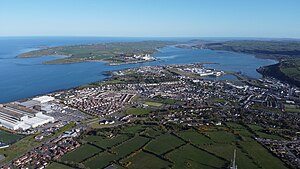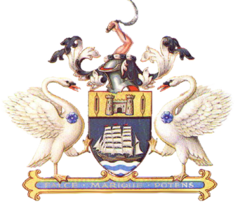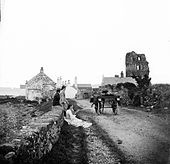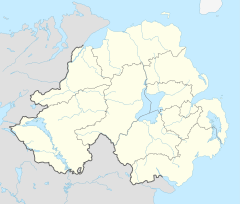Larne
| Larne | |
|---|---|
 2020 view looking south-east towards Larne Harbour, Islandmagee, and down the length of Larne Lough | |
 Larne Coat of Arms | |
Location within Northern Ireland | |
| Population | 18,853 (2021 census) |
| Irish grid reference | D4102 |
| • Belfast | 30 km (19 mi) |
| District | |
| County | |
| Country | Northern Ireland |
| Sovereign state | United Kingdom |
| Post town | LARNE |
| Postcode district | BT40 |
| Dialling code | 028 |
| Police | Northern Ireland |
| Fire | Northern Ireland |
| Ambulance | Northern Ireland |
| UK Parliament | |
| NI Assembly | |
Larne (from Irish Latharna, [ˈl̪ˠahəɾˠn̪ˠə], the name of a Gaelic territory)[1][2][3] is a town on the east coast of County Antrim, Northern Ireland, with a population of 18,853 at the 2021 census.[4] It is a major passenger and freight roll-on roll-off port.[5] Larne is administered by Mid and East Antrim Borough Council. Together with parts of the neighbouring districts of Antrim and Newtownabbey and Causeway Coast and Glens, it forms the East Antrim constituency for elections to the Westminster Parliament and Northern Ireland Assembly. The civil parish is in the historic barony of Glenarm Upper.[6]
History
[edit]
The coastal area around Larne has been inhabited for millennia, and is thought to have been one of the earliest inhabited areas of Ireland, with these early human populations believed to have arrived from Scotland via the North Channel. Knockdhu, north of Larne, was the site of a Bronze Age promontory fort and settlement. The early coastal dwellers are thought to have had a sophisticated culture which involved trading between the shores of the North Channel and between other settlements on the coasts of Scotland. The coast of Scotland is in fact clearly visible from here. Archaeological digs in the area have found flintwork and other artefacts which have been assigned dates from 6000 BC onwards. The term Larnian has even been coined by archaeologists to describe such flintworks and similar artefacts of the Mesolithic era (and one time to describe Mesolithic culture in Ireland as a whole).[7][8][9] Larnian is also currently used to refer to people from Larne.
Larne takes its name from Latharna, a Gaelic territory or túath that was part of the Ulaid minor-kingdom of Dál nAraidi.[10] The name spelt as Latharne was used at one point in reference to the Anglo-Norman cantred of Carrickfergus.[10] Latharna itself means "descendants of Lathar", with Lathar according to legend being a son of the pre-Christian king Úgaine Mór.[11] The town sprang up where the River Inver flows into Larne Lough. This area was known in Irish as Inbhear an Latharna ("rivermouth/estuary of Latharna")[12] and was later anglicised as Inver Larne or simply Inver. Latharna was only applied exclusively to the town in recent centuries. The Roman emperor Severus is known to have described how, in 204 AD, a Roman galley bound for Scotland veered off course to a place called Portus Saxa, which was believed to be Larne Lough. There was Viking activity in the area during the 10th and 11th centuries AD. Viking burial sites and artefacts have been found in the area and dated to that time.[13] Ulfreksfjord was an Old Norse name for Larne Lough. According to the Norse historian Snorri Sturluson, Connor, King of Ireland, defeated Orkney Vikings at Ulfreksfjord in 1018. Later anglicised names include Wulfrichford, Wolderfirth, Wolverflete and the surviving name Olderfleet. The ending -fleet comes from the Norse fljot, meaning "inlet".[14] Older- may come from the Norse oldu, meaning "wave".[14]

In the 13th century the Scots Bissett family built Olderfleet Castle at Curran Point. In 1315, Edward the Bruce of Scotland (brother of Robert the Bruce, King of Scotland) landed at Larne with his 6000 strong army en route to conquer Ireland, where Olderfleet Castle was of strategic importance. Edward saw Ireland as another front in the ongoing war against Norman England.
In 1569, Queen Elizabeth I, Queen of England and Ireland, appointed Sir Moyses Hill as the governor of Olderfleet Castle. It was seen as strategically important for any Tudor conquest of Ulster. Following the 17th century Union of the Crowns of Scotland, England and Ireland under James VI & I many more settlers would have arrived to Ulster via Larne during the Plantation of Ulster. The area around County Antrim itself, however, was not part of the official 17th century Plantation; instead many Scottish settlers arrived in the area through private settlement in the 17th century.
During the 18th century many Scots-Irish emigrated to America from the port of Larne. A monument in the Curran Park commemorates the Friends Goodwill, the first emigrant ship to sail from Larne in May 1717, heading for Boston, Massachusetts in the New England region of the modern United States of America. Boston's long standing Scots-Irish roots can be traced to Larne. The town is documented as being the first in county Antrim to be taken by United Irishmen during the ill-fated rebellion of 1798. The Protestant rebels from this area (almost entirely Presbyterian) filled Larne and engaged the government forces around 2am on the morning of 7 June. This surprise attack drove the garrison to flee the town, at which point the rebel force marched off to join up with McCracken and fight in the Battle of Antrim.[15]
In 1914, Loyalists opposed to the Home Rule Act 1914 prepared for armed resistance. In an episode known as the Larne Gun Running German, Austrian and Italian weapons with ammunition were transported into the ports of Larne and Bangor in the dead of night and distributed throughout Ulster.[16] This event marked a major step in cementing the right to Ulster Unionist self-determination, with the recognition of such a right ultimately leading to the creation of Northern Ireland.
The Troubles
[edit]Larne throughout the course of The Troubles had a significant paramilitary presence in the town, mostly through the presence of the Ulster Volunteer Force (UVF) and Ulster Defence Association (UDA). For further information see UDA South East Antrim Brigade.
The town suffered a number of Provisional Irish Republican Army (IRA) bomb attacks during The Troubles, notably including a large car bomb at the King's Arms hotel[17] in 1980 that caused damage to the main shopping areas, for which the IRA claimed responsibility. This incident was raised in Parliament at the time.[18]
Incidents which involved fatalities
- 16 September 1972: Sinclair Johnston a UVF member, was shot by the Royal Ulster Constabulary during street disturbances in the town when the Royal Ulster Constabulary were protecting Catholics living in St Johns Place.[19]
- 20 November 1974: Kevin Regan died from his injuries received in a UVF attack five days before on Maguires bar on Lower Cross Street. The Larne UDA blamed the IRA for the attack.[20]
- 6 February 1975: Colette Brown, a Catholic, was found by the side of the Killyglen Road after being shot by Loyalists.[21] Two men, one a UVF member the other a Lance Corporal in the UDR (Ulster Defence Regiment) were later convicted of her murder.[22]
- 8 September 1975: Michael O'Toole a Catholic, died from his injuries sustained in a loyalist booby trap bomb attached to his car two days previously.[23]
- 24 August 1980: Rodney McCormick a Catholic, was shot dead by the Ulster Defence Association (UDA) in the Antiville area of the town. The gunmen involved were convicted.[24]
- 11 July 2000: Andrew Cairns a UVF member, was killed by members of the UDA[25] at an eleventh night bonfire celebration in a suspected loyalist feud at Boyne Square. He may also have been murdered due to his alleged involvement in an earlier assault.[26] The Royal Ulster Constabulary detective inspector, George Montgomery, did not find any motive for the murder. David Ervine (PUP) stated that there was no Loyalist feud.[27]
Geography
[edit]
In the foreground is Islandmagee in Northern Ireland, followed by Stena Line ferries entering and leaving Larne, and The Maidens lighthouses.
In the background are the Scottish Paps of Jura on the left and Mull of Kintyre on the right.
Larne sits on the western side of a narrow inlet that links Larne Lough to the sea. On the eastern side of the inlet is a peninsula called Islandmagee. To the west of Larne is the ancient volcanic formation of Antrim Plateau, with its glaciated valleys scenically sweeping down to the sea to the north of Larne in what are known as the Glens of Antrim. Larne is 25 miles from the Scottish mainland, with views across the North Channel towards the Mull of Kintyre, Rhins of Galloway, Islay and Paps of Jura often visible from the Larne area – this proximity to Scotland has had a defining influence on Larne's history and culture.
The town is within the small parish of the same name. Like the rest of Ireland, this parish is divided into townlands. The following is a list of townlands within Larne's urban area, along with their likely etymologies:[28]
- Antiville (likely from An Tigh Bhile meaning "the house of the old tree")
- Ballyboley (from Baile Buaile meaning "townland of the booley/dairy place")
- Ballycraigy (from Baile Creige meaning "townland of the rocky outcrop")
- Ballyloran (from Baile Loairn meaning "Loarn's townland")
- Blackcave North
- Blackcave South
- Curran and Drumalis (from Córran meaning "crescent" and Druim a' Lios meaning "ridge of the ringfort")
- Greenland
- Inver (from Inbhear meaning "rivermouth")
Many street names in Larne end in brae, such as 'Whitla's Brae' which comes from the Scots for "hillside".
Civil parish of Larne
[edit]The civil parish contains the following townlands:[6] Antiville, Ballyboley, Ballycraigy, Ballyloran, Blackcave North, Blackcave South, Curran and Drumaliss, Glebe, Greenland and Town Parks.
Gallery
[edit]Places of interest
[edit]


The town has several parks, including Town Park, Chaine Park, Curran Park, and Smiley Park.[29] Other leisure facilities include Larne Leisure Centre[30] and Larne Museum & Arts Centre.[31] Cairndhu Golf Course is situated atop of Ballygally Head[32] and Larne Golf Course on sits atop of the Islandmagee peninsula.[33]
Significant buildings and structures include Olderfleet Castle.[34]
Magheramorne, 5 miles to the south along Larne Lough,[35] has a film studio which was used to film much of HBO TV Series Game of Thrones.[36]
Demography
[edit]2021 Census
[edit]On census day (21 March 2021) there were 18,853 people living in Larne.[4] Of these:
- 17.77% were aged under 16, 63.10% were aged between 16-65, and 19.13% were aged 66 and over.[37]
- 51.27% of the usually resident population were female and 48.73% were male.[38]
- 62.4% belong to or were brought up Protestant (including other Christian-related denominations), 23.9% belong to or were brought up Catholic, 0.9% belong to or were brought up in an 'other' religion, and 12.8% did not adhere to or weren't brought up in any religion.[39]
- 66.6% indicated that they had a British national identity,[40] 38.3% had a Northern Irish national identity,[41] 10.3% had an Irish national identity,[42] and 4.2% indicated they had an 'other' national identity.[43] (respondents could indicate more than one national identity).
- 17.51% had some knowledge of Ulster Scots and 3.84% had some knowledge of Irish (Gaeilge).
2011 Census
[edit]On census day (27 March 2011) there were 18,755 people living in Larne, accounting for 1.04% of the NI total.[44][45] Of these:
- 18.59% were aged under 16 years and 18.00% were aged 65 and over.
- 51.98% of the usually resident population were female and 48.02% were male.
- 67.03% belong to or were brought up Protestant and other non-Catholic Christian (including Christian related) and 25.97% belong to or were brought up Catholic.
- 71.62% indicated that they had a British national identity, 30.56% had a Northern Irish national identity and 8.75% had an Irish national identity (respondents could indicate more than one national identity).
- 41 years was the average (median) age of the population.
- 17.20% had some knowledge of Ulster-Scots and 4.02% had some knowledge of Irish (Gaeilge).
Industry and commerce
[edit]
Ballylumford power station in Northern Ireland's main power station. Other energy operators in Larne include B9 Energy (a renewable energy development company).[46]
Larne is also home to the headquarters of Caterpillar (NI) Limited (part of the Caterpillar group which manufactures diesel and gas generators),[47] InspecVision (industrial inspection equipment),[citation needed] TerumoBCT (a Japanese manufacturer of intravenous drip solutions and blood products),[48] and the LEDCOM (Larne Enterprise Development Company) business park.[49]
A number of shops can be found along Larne Main Street, Dunluce Street, Laharna Retail Park, and large supermarkets off the Harbour Highway near the harbour. A market is also held every Wednesday at the Larne Market Yard.[50]
Transport
[edit]
Ferry
[edit]Ferries sail from the harbour to Cairnryan in Scotland. Passenger services are operated by P&O Irish Sea which describes the crossings from Larne to Scotland as "the shortest, fastest crossings" due to the close proximity that Larne has to Scotland. An Irish Sea Bridge has been proposed, connecting Larne with Portpatrick in Scotland.
Road
[edit]
Larne is connected to Belfast by the A8 road. The A2 road or 'Antrim coast road' which runs along the Antrim coast, and passes through the scenic Glens of Antrim, also serves the town. South of the town the A2 passes the side of Larne Lough, via Glynn, Magheramorne, and Ballycarry, to Whitehead and Carrickfergus. The A36 road runs from the town to Ballymena.
Rail
[edit]The Belfast–Larne railway line connects to Belfast Grand Central and Belfast Lanyon Place, via Whitehead, Carrickfergus and Jordanstown, also connects Larne to the Northern Ireland Railways network. Currently there is no freight transport by rail in Northern Ireland. Both Larne Town railway station and Larne Harbour railway station opened on 1 October 1862 and closed for goods traffic on 4 January 1965.[51]
The Ballymena and Larne Railway was a narrow gauge railway. It opened in 1878, was closed to passengers in 1933 and finally completely closed in 1950. Another line ran from Larne to Ballyclare and some parts of it can still be made out where it ran along the Six Mile valley.
Public services
[edit]
Larne Town Hall, the former headquarters of Larne Borough Council, was completed in 1870.[52] Moyle Hospital offers limited services after the closure of its accident and emergency department.[53]
Education
[edit]Secondary schools serving the area include Larne Grammar School and Larne High School.[54] Northern Regional College (formerly Larne Technical College) is a college of further education.[55]
Notable people
[edit]- Smiley baronets, series of baronets important in History of Larne
- Dianne Barr, paralympic swimmer
- Billy Brown, musician
- James Chaine, Member of Parliament
- Dave Clements, footballer and football manager
- Fyfe Ewing, musician, drummer (Therapy?)
- Robert Ferguson, disc jockey
- Keith Gillespie, Sheffield United and Northern Ireland midfielder.
- Robert John Gregg, pioneer of the academic study of Ulster-Scots dialects as well as a linguistic authority on Canadian English
- Mark Haggan, activist
- Richard Hayward, actor/singer, author
- Valerie Hobson, actress
- Jeff Hughes, footballer
- Michael Hughes, Wimbledon and Coventry City footballer
- Whitford Kane, actor
- Valerie Lilley, actor (Shameless)
- Phillip Magee (The X Factor, series 2 finalist
- Sir Ivan Magill, innovating anaesthetist; went to Larne Grammar school
- Dave McAuley, former IBF Flyweight world champion boxer
- Gareth McAuley, current West Bromwich Albion defender
- Colin McGarry, Professional Darts Corporation player
- Adam McGurk, footballer
- James McIlroy, Olympic runner
- Bobby McKee, Democratic Unionist Party councillor; former Mayor of Larne[56]
- Jack McKee, alderman and veteran loyalist politician
- Michael McKeegan, musician (Therapy?)
- Amanda McKittrick Ros, author, poet; taught at Millbrook National School during the 1880s
- Eddie McMorran, footballer
- Arthur Meek, army officer
- Eddie Mooney, musician (The Dakotas, The Fortunes)
- Hugh Nelson, Lieutenant Governor of British Columbia (1830–1893)
- Robert Nelson, electronic music producer (Agnelli & Nelson)
- Jonathan Rea, Superbike World Championship rider
- Maxwell Reed, actor
- Keith Semple, (One True Voice from the ITV series Popstars: The Rivals)
- Jonny Steele, Wolverhampton Wanderers F.C., New York Red Bulls and Northern Ireland footballer
- Norman Surplus, first person to complete a circumnavigation of Earth by Autogyro
- Harry Towb, actor
Freedom of the borough
[edit]In memory of a battle in the town of Musa Qala in Afghanistan in 2006, involving the Royal Irish Regiment, a new regimental march, composed by Chris Attrill and commissioned by Larne Borough Council, was gifted to the regiment on Saturday 1 November 2008 in Larne, during an event in which the regiment was presented with "the Freedom of the Borough".
This gave the regiment the right to march through the towns of the borough with 'flags flying, bands playing and bayonets fixed'. The march was named Musa Qala.[57]
Events
[edit]The Friends Goodwill Music Festival occurs in May each year and supports local music.[58]
Sport
[edit]Larne F.C., a professional association football club, plays in the NIFL Premiership.[59] Local amateur football clubs include Larne Technical Old Boys F.C. and Wellington Recreation F.C.[60]
Twin city
[edit]Larne is twinned with Clover, South Carolina, which has named one of its schools, Larne Elementary School,[61] after Larne.
Notable facts
[edit]See also
[edit]- List of civil parishes of County Antrim
- List of localities in Northern Ireland by population
- List of RNLI stations
References
[edit]- ^ a b Larne/Latharna. Placenames Database of Ireland.
- ^ "Postal Towns/Bailte Poist" (PDF). Archived from the original (PDF) on 7 February 2012.. Northern Ireland Place-Name Project. Queen's University Belfast.
- ^ Room, Adrian. Placenames of the World. McFarland, 2006. p.213
- ^ a b "Settlement 2015". NISRA. Retrieved 21 August 2023.
- ^ Tibus, Website design and website development by. "Port of Larne – About Us – History". Archived from the original on 10 March 2019. Retrieved 16 April 2017.
- ^ a b "Larne". IreAtlas Townlands Database. Retrieved 20 April 2015.
- ^ "Larne Borough council – Local History and Heritage". Archived from the original on 8 April 2015. Retrieved 16 April 2017.
- ^ "Answers – The Most Trusted Place for Answering Life's Questions". Answers.com. Retrieved 16 April 2017.
- ^ "Larnian industry – ancient culture". Retrieved 16 April 2017.
- ^ a b MacCotter, Paul (31 October 2014). Medieval Ireland. Territorial, Political and Economic Divisions. The Heritage Council. ISBN 9781846825576.
- ^ Place Names Northern Ireland. "Larne, County Antrim". Retrieved 29 August 2016.
- ^ Patrick Weston Joyce (1870). Irish Local Names Explained. Retrieved 10 October 2020 – via Library Ireland.
- ^ "Fejl: Siden blev ikke fundet / adgang er ikke tilladt". Archived from the original on 16 July 2012. Retrieved 16 April 2017.
- ^ a b Geoffrey Malcolm Gathorne-Hardy. The Norse Discoverers of America. Clarendon Press, 1921.
- ^ Hope, J., & Newsinger, J. (2001). United Irishman : the autobiography of James Hope: The autobiography of James Hope. p33-34 London: Merlin.
- ^ A. T. Q. Stewart: "The Ulster Crisis", London, Faber and Faber Ltd., 1967 SBN 571 08066 9
- ^ "PaceMaker Press". Retrieved 16 April 2017.
- ^ "Terrorist Incident (Larne)". Parliamentary Debates (Hansard). 6 May 1980. Retrieved 16 April 2017.
- ^ David McKittrick et al Lost Lives page 264-265
- ^ David McKittrick et al Lost Lives page 495-496
- ^ David McKittrick et al Lost Lives page 514-515
- ^ David McKittrick et al Lost Lives page 366
- ^ David McKittrick et al Lost Lives page 575-576
- ^ David McKittrick et al Lost Lives page 836
- ^ "UVF man shot as loyalists fall out". The Guardian. 13 July 2000. Retrieved 2 December 2022.
- ^ David McKittrick et al Lost Lives page 1478-1479
- ^ "BBC News – NORTHERN IRELAND – Fresh appeal after bonfire murder". Retrieved 16 April 2017.
- ^ "Northern Ireland Placenames Project". Retrieved 12 June 2010.
- ^ "Larne Borough Council overview". Archived from the original on 8 April 2015. Retrieved 16 April 2017.
- ^ "Leisure Centre". Archived from the original on 14 May 2012. Retrieved 16 April 2017.
- ^ "bB査定☆超簡単に高額査定ゲット!わかりやすく解説しています". Retrieved 16 April 2017.
- ^ "Home". Retrieved 16 April 2017.
- ^ "Home". Retrieved 16 April 2017.
- ^ "Olderfleet Castle" (PDF). Environment and Heritage Service NI – State Care Historic Monuments. Archived from the original (PDF) on 22 July 2012. Retrieved 3 December 2007.
- ^ "Magheramorne reinvented by Lafarge". Archived from the original on 28 June 2016. Retrieved 16 April 2017.
- ^ Game of Thrones Season 5: A Day in the Life. HBO. 8 February 2015. Archived from the original on 21 December 2021. Retrieved 17 July 2017 – via YouTube.
- ^ "Preview data for your table | NISRA Flexible Table Builder". build.nisra.gov.uk. Retrieved 29 March 2024.
- ^ "Preview data for Sex (MS-A07) | NISRA Flexible Table Builder". build.nisra.gov.uk. Retrieved 29 March 2024.
- ^ "Religion or religion brought up in". NISRA. Retrieved 21 August 2023.
- ^ "National Identity (British)". NISRA. Retrieved 21 August 2023.
- ^ "National Identity (Northern Irish)". NISRA. Retrieved 21 August 2023.
- ^ "National Identity (Irish)". NISRA. Retrieved 21 August 2023.
- ^ "Preview data for National identity (person based) - basic detail (classification 1) (MS-B15) | NISRA Flexible Table Builder". build.nisra.gov.uk. Retrieved 29 March 2024.
- ^ "Census 2011 Population Statistics for Larne Settlement". Northern Ireland Statistics and Research Agency (NISRA). Retrieved 10 August 2019.
 This article contains quotations from this source, which is available under the Open Government Licence v3.0. © Crown copyright.
This article contains quotations from this source, which is available under the Open Government Licence v3.0. © Crown copyright.
- ^ "Census 2011 Population Statistics for Larne Local Government District". Northern Ireland Statistics and Research Agency (NISRA). Retrieved 17 January 2017.
- ^ Energy, B9. "B9 Energy Homepage". Retrieved 16 April 2017.
{{cite web}}: CS1 maint: numeric names: authors list (link) - ^ "FGW – Contact Us". Retrieved 16 April 2017.
- ^ "Terumo BCT". Retrieved 16 April 2017.
- ^ "LEDCOM -Expert business advice and resources in Larne and Co. Antrim". Retrieved 16 April 2017.
- ^ "Larne Borough Council – Larne Market". Archived from the original on 1 April 2014. Retrieved 16 April 2017.
- ^ "Larne stations" (PDF). Railscot – Irish Railways. Retrieved 28 August 2007.
- ^ "Town Hall (HB 06/12/002)". Department for Communities. Retrieved 29 June 2021.
- ^ "Moyle Hospital, Larne". National Archives. Retrieved 29 March 2020.
- ^ "Larne High School shares successes with Minister". Controlled Schools Support Council. 1 October 2020. Retrieved 18 November 2022.
- ^ "Principal's reception". Northern Regional College. Retrieved 18 November 2022.
- ^ "Bobby McKee elected new Mayor of Larne". Larne Times. Johnston Publishing. 12 June 2008. Retrieved 11 August 2014.
- ^ "New march to be gifted at Larne ceremony". Archived from the original on 12 September 2012. Retrieved 16 April 2017.
- ^ "Friends Goodwill Music Festival returns to Larne". Belfast Live. 29 April 2022. Retrieved 18 November 2022.
- ^ "Larne FC owner Kenny Bruce lobbied Stormont parties to back embattled Mid and East Antrim council boss after NI Protocol letter row". Belfast Live. 14 May 2021. Retrieved 1 January 2022.
- ^ "Wellington Recreation F.C." Northern Amateur Football League. Retrieved 18 November 2022.
- ^ "Larne Elementary School / Homepage". Retrieved 16 April 2017.
- ^ "Larnite Mineral Data". webmineral.com.
Further reading
[edit]- Cowsill, Miles (1998). Stranraer–Larne: The Car Ferry Era. Narberth, Pembrokeshire: Ferry Publications. ISBN 1871947405.





